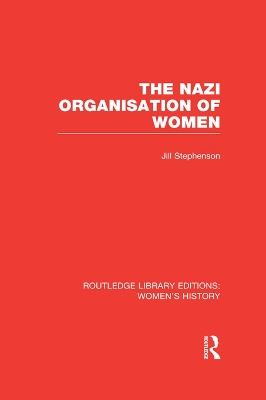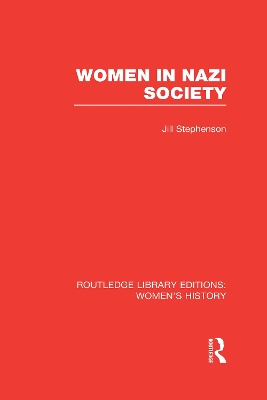Routledge Library Editions: Women's History
2 total works
The Nazi's were implacably opposed to feminism and women's independence. Rosa Luxemburg became a symbol of all that most horrified them in German society, in particular because of her involvement in active politics. Nazi ideology saw women in the activist role of 'wives, mothers and home-makers', and their task was to support their fighting menfolk by providing food and making and mending uniforms and flags.
The miscellany of women's organisations was dissolved and reunified by Gregor Strasser in 1931, and in 1934 Gertrud Scholtz-Klink became an overall leader of the Nazi Women's Group, after which it functioned primarily as a propaganda channel. Part of the policy of Gleichschaltung (co-ordination) meant that even to join a sewing group, women had to choose the party group or nothing.
This book provides a detailed and fascinating picture of the origins, development and functions of the specifically women's organisations associated with the NSDAP from their beginnings in the early 1920s, until their demise in 1945. It traces the history of the Nazi Women's Group, the sources of its members and analyses their ambitions and hopes from the Frauenwerk. Its purpose is above all to make an important contribution to the study of National Socialism as a movement which attracted and held the enthusiasm of a small minority of Germans who, given the chance from 1933, attempted to impose their will on the majority.
This fascinating book examines the position of women under the Nazis. The National Socialist movement was essentially male-dominated, with a fixed conception of the role women should play in society; while man was the warrior and breadwinner, woman was to be the homemaker and childbearer. The Nazi obsession with questions of race led to their insisting that women should be encouraged by every means to bear children for Germany, since Germany's declining birth rate in the 1920s was in stark contrast with the prolific rates among the 'inferior' peoples of eastern Europe, who were seen by the Nazis as Germany's foes. Thus, women were to be relieved of the need to enter paid employment after marriage, while higher education, which could lead to ambitions for a professional career, was to be closed to girls, or, at best, available to an exceptional few. All Nazi policies concerning women ultimately stemmed from the Party's view that the German birth rate must be dramatically raised.

